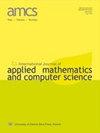A Contemporarymulti–Objective Feature Selection Model for Depression Detection Using a Hybrid pBGSK Optimization Algorithm
IF 1.2
4区 计算机科学
Q3 AUTOMATION & CONTROL SYSTEMS
International Journal of Applied Mathematics and Computer Science
Pub Date : 2023-03-01
DOI:10.34768/amcs-2023-0010
引用次数: 1
Abstract
Abstract Depression is one of the primary causes of global mental illnesses and an underlying reason for suicide. The user generated text content available in social media forums offers an opportunity to build automatic and reliable depression detection models. The core objective of this work is to select an optimal set of features that may help in classifying depressive contents posted on social media. To this end, a novel multi-objective feature selection technique (EFS-pBGSK) and machine learning algorithms are employed to train the proposed model. The novel feature selection technique incorporates a binary gaining-sharing knowledge-based optimization algorithm with population reduction (pBGSK) to obtain the optimized features from the original feature space. The extensive feature selector (EFS) is used to filter out the excessive features based on their ranking. Two text depression datasets collected from Twitter and Reddit forums are used for the evaluation of the proposed feature selection model. The experimentation is carried out using naive Bayes (NB) and support vector machine (SVM) classifiers for five different feature subset sizes (10, 50, 100, 300 and 500). The experimental outcome indicates that the proposed model can achieve superior performance scores. The top results are obtained using the SVM classifier for the SDD dataset with 0.962 accuracy, 0.929 F1 score, 0.0809 log-loss and 0.0717 mean absolute error (MAE). As a result, the optimal combination of features selected by the proposed hybrid model significantly improves the performance of the depression detection system.基于混合pBGSK优化算法的当代抑郁症检测多目标特征选择模型
抑郁症是全球精神疾病的主要原因之一,也是自杀的潜在原因。社交媒体论坛上用户生成的文本内容为建立自动可靠的抑郁症检测模型提供了机会。这项工作的核心目标是选择一组最优的特征,这些特征可能有助于对社交媒体上发布的抑郁内容进行分类。为此,采用了一种新的多目标特征选择技术(EFS-pBGSK)和机器学习算法来训练所提出的模型。该方法将基于二元增益共享知识的优化算法与种群约简(pBGSK)相结合,从原始特征空间中获得优化后的特征。使用扩展特征选择器(EFS)根据特征的排序过滤掉多余的特征。从Twitter和Reddit论坛收集的两个文本凹陷数据集用于评估所提出的特征选择模型。实验使用朴素贝叶斯(NB)和支持向量机(SVM)分类器对5种不同的特征子集大小(10、50、100、300和500)进行分类。实验结果表明,该模型可以获得较好的性能分数。SVM分类器对SDD数据集的准确率为0.962,F1分数为0.929,log-loss为0.0809,平均绝对误差(MAE)为0.0717。结果表明,所提出的混合模型所选择的最优特征组合显著提高了凹陷检测系统的性能。
本文章由计算机程序翻译,如有差异,请以英文原文为准。
求助全文
约1分钟内获得全文
求助全文
来源期刊
CiteScore
4.10
自引率
21.10%
发文量
0
审稿时长
4.2 months
期刊介绍:
The International Journal of Applied Mathematics and Computer Science is a quarterly published in Poland since 1991 by the University of Zielona Góra in partnership with De Gruyter Poland (Sciendo) and Lubuskie Scientific Society, under the auspices of the Committee on Automatic Control and Robotics of the Polish Academy of Sciences.
The journal strives to meet the demand for the presentation of interdisciplinary research in various fields related to control theory, applied mathematics, scientific computing and computer science. In particular, it publishes high quality original research results in the following areas:
-modern control theory and practice-
artificial intelligence methods and their applications-
applied mathematics and mathematical optimisation techniques-
mathematical methods in engineering, computer science, and biology.

 求助内容:
求助内容: 应助结果提醒方式:
应助结果提醒方式:


